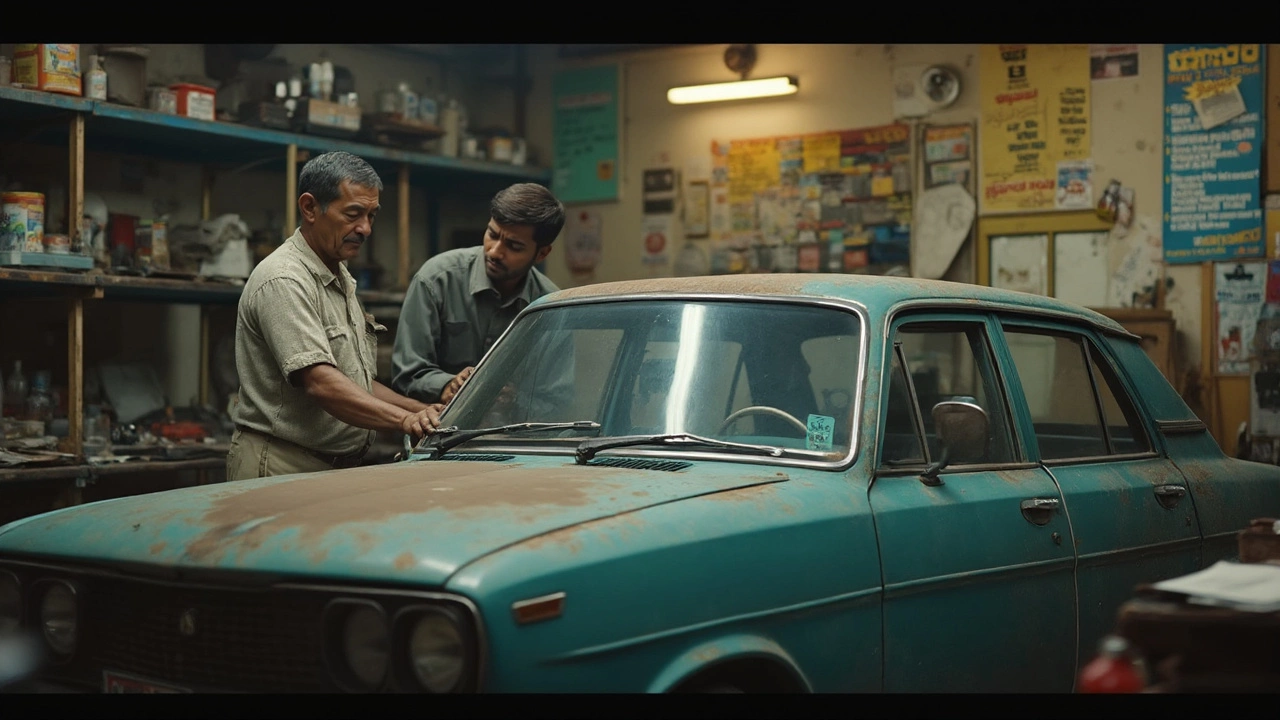Sitting on the fence about whether to sell, scrap, or hold on to your old car? The 15 year car rule in India has thrown a wrench into the plans of many vehicle owners. Basically, if your car is registered as a private vehicle, you can't keep driving it in most cities after it's been on the road for 15 years—unless you jump through a few hoops.
This rule isn't just a random government decision. It's all about fighting air pollution and clearing out unsafe vehicles from the streets. Cars guzzle more fuel and cough out more smoke as they age. So when that 15-year mark hits from the date of registration, you’re looking at a dead end—or at least some extra paperwork, costs, and decisions to make.
But not all states apply the rule with equal strictness. Delhi is the toughest: petrol cars have to go after 15 years and diesel ones after just 10. Other states let you renew registration, but it takes time, money, and passing a strict fitness test.
If your car is almost 15 years old, don’t wait for a surprise fine. Start looking into your options, like prepping for the fitness test or planning for scrappage. If your car is in good shape, you might get a few more years out of it—but only if you follow the right process and keep all your papers updated.
- What the 15 Year Car Rule Really Means
- Why Did India Bring in This Rule?
- How the Rule Changes for Petrol and Diesel Cars
- What Happens When Your Car Turns 15?
- How to Legally Keep or Scrap Your Old Car
- Tips to Make the Most of an Ageing Vehicle
What the 15 Year Car Rule Really Means
If you own a car in India, you’ve probably heard the buzz around the 15 year car rule India. But what does it actually mean for you? In simple terms, the rule says your private car’s registration expires 15 years after the date when it was first registered. Once the clock hits 15, that registration isn’t valid anymore unless you renew it—if renewal is even allowed where you live.
Here’s where it gets real: the rule isn’t applied exactly the same way everywhere. Delhi is famous (or infamous) for being strict. There, once your petrol car hits the 15-year mark, it's banned from public roads no matter how well it runs. Diesel cars get it even worse—only 10 years. Other states, though, usually let you go for a renewal after 15 years, but you’ll need to clear a vehicle fitness test every five years.
Below is a snapshot of how the 15 year car rule India lands in different regions:
| Location | Petrol Car Limit | Diesel Car Limit | Renewal Option |
|---|---|---|---|
| Delhi NCR | 15 years | 10 years | No renewal allowed |
| Mumbai, Bengaluru, most other states | 15 years | 15 years | Possible after passing a fitness test |
The main driver behind this rule is tackling pollution from older vehicles. Data from the Ministry of Road Transport and Highways in 2022 showed vehicles older than 10 years made up almost 25% of Delhi’s registered cars, and contributed over 50% of vehicular air pollution. That’s a big deal.
Violating the rule can hit your wallet hard. Getting caught with an expired registration may land you hefty fines, and your car could even be impounded. If you live in a city that enforces the rule strictly, there’s just no way around it.
The 15 year car rule India is the government’s way of pushing people toward newer, cleaner vehicles and keeping the roads safer. If your car is anywhere close to 15 years old, it’s wise to know the exact rules in your state and plan your next move ahead of time.
Why Did India Bring in This Rule?
This 15 year car rule India isn’t just busywork for car owners. The government put this in place to tackle a growing problem: air pollution and outdated cars clogging up roads. Old cars burn more fuel and spit out more harmful gases than newer, cleaner models. The Ministry of Road Transport and Highways has reported that vehicles over 10 years old are responsible for a big share of urban pollution—a whopping 60% of vehicle emissions in cities come from these aging vehicles.
India’s air quality charts are some of the worst in the world. Cities like Delhi, Mumbai, and Kolkata often make global headlines for smog and traffic jams. Bad air isn’t just an eyesore; it’s a health risk. The World Health Organization says air pollution kills over 1.6 million people each year in India. Cutting down on emissions from old vehicles is a fast way to chip away at this scary number.
It’s not just about pollution, though. Safety is another big reason. Old cars are more likely to have brake failure, faulty airbags, or rusting parts. For daily commuters, buses, or even families, that can mean a risky drive every day. The vehicle scrappage policy wants these beat-up rides off the road, making way for new cars with better tech and safety standards.
This isn’t a trend started in India alone. Countries like Japan and Germany run similar rules to keep roads safer and cleaner. The Indian government is using the car registration India process as a checkpoint, making sure only fit and relatively clean cars keep rolling on the roads.
| Reason | Impact |
|---|---|
| Reduce Air Pollution | Lower emissions in cities |
| Improve Road Safety | Fewer accidents from faulty cars |
| Support New Car Sales | Boosts auto sector and jobs |
| Aligned with Global Practices | Modernizes Indian transport |
If you’re holding on to a ride from the 2000s, the message is clear: cleaner, safer, and more efficient vehicles are the way forward. Keeping up with the 15 year car rule India isn’t just about following the law—it’s about breathing easier and driving safer for everyone.
How the Rule Changes for Petrol and Diesel Cars
The 15 year car rule India hits petrol and diesel car owners differently depending on where you live. One size definitely doesn’t fit all. Here’s what’s actually happening on the ground.
In the National Capital Region (NCR), especially Delhi, the rules are famously strict. Diesel cars get the chop after just 10 years. Petrol cars get a few more years—15 to be exact. It doesn't matter if the car is in mint condition; if it’s old by their rulebook, it’s off the road. This is a direct response to Delhi’s massive air pollution crisis, where old diesel engines were found to spew way more harmful stuff into the air compared to petrol cars.
Once you step outside NCR, things look more flexible. Most other major states let you renew the registration of a petrol or diesel car after the original period—15 years for both. But you’re not off the hook. You’ll have to get the car tested for fitness at an authorized center. It’s a bit like a health check-up for your car. Fail it, and you can’t drive anymore. Pass, and you get a 5-year extension, but you’ll need to go through the process every five years after that.
- Petrol cars: 15 years of legal road use from registration in most states, possible to renew with fitness tests.
- Diesel cars: 15 years in most states, but only 10 years in Delhi NCR—after that, strictly no renewals or extensions allowed.
Here's a quick look at how different regions apply the rule:
| Region | Petrol Cars | Diesel Cars |
|---|---|---|
| Delhi NCR | 15 Years | 10 Years |
| Most Other States | 15 Years (renewable) | 15 Years (renewable) |
The vehicle scrappage policy is also tied to these rules, encouraging owners to retire older cars rather than push unsafe ones onto the streets. The government sometimes offers small incentives for scrapping and replacing old cars with cleaner models, though don’t expect a windfall.
If you’re considering keeping an older car, make sure you’re super clear on your state’s version of the law. For folks moving between states, this can get tricky—a car legal in Mumbai might be illegal within days in Delhi.

What Happens When Your Car Turns 15?
When your car hits that 15-year mark from its original registration date, things change fast. The 15 year car rule in India means your vehicle is now considered "old" by government standards. What exactly happens next depends on your state—Delhi is strict, while some other regions are a bit more flexible.
Here’s what most car owners can expect:
- Registration Expires: Your car’s registration automatically becomes invalid once it turns 15 years old. You can’t just renew it online like a regular RC renewal for newer cars.
- Mandatory Fitness Test: To keep using your car, you must take it to an authorized fitness testing center. If it fails, that's the end of the road—no appeals, no more extensions.
- Renewal Possible (Depends on State): If your car passes the fitness test (and you’re not in stricter places like Delhi), you get another 5-year registration renewal. But this can be expensive, and you’ll have to repeat the test every five years.
- Banned on Roads if Rejected: If your car fails or you skip the test, it’s officially banned from public roads. Cops can fine you or even seize the vehicle if you’re caught driving it.
Let’s look at how different states treat car registration in India after 15 years:
| Region | Petrol Cars | Diesel Cars | Is Renewal Allowed? |
|---|---|---|---|
| Delhi | Banned at 15 years | Banned at 10 years | No |
| Maharashtra | Banned unless fitness passed | Banned unless fitness passed | Yes, after fitness test |
| Karnataka | Banned unless fitness passed | Banned unless fitness passed | Yes, after fitness test |
| Tamil Nadu | Banned unless fitness passed | Banned unless fitness passed | Yes, after fitness test |
If you think it’s just about documents, think again. The fitness tests involve brakes, emission checks, and structural integrity. Mechanics and RTO staff won’t bend the rules—it’s pass or fail. No shortcuts.
Ignore the 15 year rule, and you risk heavy fines (often Rs 10,000 or more), and your insurance becomes void for any road accidents. Your best move? Mark your car’s registration date in your calendar, and start planning at least six months before you hit the 15-year mark. Don’t leave it up to chance—or luck!
How to Legally Keep or Scrap Your Old Car
So your car is creeping up on 15 years, and you’re staring at the 15 year car rule India straight in the face. What next? You basically have two options: try to keep your trusted ride or send it for scrapping. Both paths come with their own set of steps and legal to-dos.
If you want to keep your car on the road, renewal isn’t automatic. Here’s what you need to do:
- Take your car to an authorised Regional Transport Office (RTO) for a fitness test. Forget about skipping this—no fitness certificate, no renewal.
- If your car passes the test, you pay the renewal fee (which went up in 2021). As of now, it’s usually around ₹5,000 for private cars, but check local rates as they can change fast.
- Don’t ignore the fitness certificate expiry. Driving with an expired certificate gets you a steep fine—think ₹5,000 up to ₹10,000 for a first-timer in many states.
- If your car fails, you can attempt repairs and re-test once. If it fails again, you won’t get registration renewed.
If you’re in Delhi, there’s no renewal at all. After 15 years for petrol or 10 for diesel, it’s a hard stop—no exceptions, even if your car is running like new. Your only road left is scrapping.
Thinking of scrapping? There’s actually a formal process now, not just dumping your car at some roadside yard.
- Visit a government-authorised scrapping facility. These are spread across most big cities.
- Give them your original RC, valid insurance, and ID proof. They’ll verify your paperwork and the car’s chassis number.
- Once stripped and scrapped, you’ll get a Certificate of Deposit. Hand this over to the RTO to de-register your vehicle officially.
- This certificate can sometimes give you a rebate (usually 5%–25%) on road tax or registration fees if you buy a new car—states differ, so always check local rules.
Worried about resale? Technically, you can transfer ownership before that 15-year mark—but both you and the buyer need to ensure the car meets all fitness and emission rules in the buyer’s state. After 15 years, new registration in another state is nearly impossible for most private cars.
Here’s a quick view comparing steps to keep or scrap your old car:
| Option | Key Steps | Possible Costs |
|---|---|---|
| Keep (Renew) | Fitness test, renewal fees, update insurance | ₹5,000+ renewal, test repair costs |
| Scrap | Visit authorised scrapper, submit documents, de-register | Chance at scrap value + rebate, no fines |
Don’t try shortcuts—faking documents or ditching the system can land you in legal soup. Play by the rules and you’ll avoid fines, headaches, or surprises if you plan to buy a new car down the road.
Tips to Make the Most of an Ageing Vehicle
If your ride is inching closer to that 15 year car rule India deadline, it’s not all doom and gloom. There’s a lot you can do to stretch the life of your vehicle and avoid headaches when those renewal checks come knocking. Here’s how you keep your old car street-legal and safe until the rule truly pulls the plug.
- Stay Super Regular with Maintenance: Old cars fail fitness tests mostly because of ignored oil changes, clunky brakes, or gone-bad batteries. Stick to those service schedules, and don’t skimp on OEM quality replacement parts.
- Keep Pollution Under Control: Your car needs to pass pollution tests every year after it’s 15. Get emissions checked more often—before the fitness test—so you catch any issues early and don’t get a rejection sticker.
- Fix Visible Damage Sooner: Headlights, bumpers, cracked windshields, or even minor rust can make or break a renewal. The inspector will check it all. Tidy up dings and dents in advance.
- Document Everything: Keep all previous pollution, fitness, insurance, and tax papers safe. If you go for renewal under the vehicle scrappage policy or car registration India rules, missing paperwork slows everything down or gets you a flat-out “no.”
- Upgrade or Replace Key Parts: Swapping old tyres, putting in a better battery, or cleaning the exhaust system can sometimes get an old car through an inspection it would’ve otherwise failed.
Wondering how strict this gets in real life? Check these recent 2024 data notes for fitness test results from Delhi:
| Fitness Test Pass Rate | Category |
|---|---|
| 68% | Petrol Cars (12-15 years old) |
| 41% | Diesel Cars (10-15 years old) |
Pretty clear—petrol cars have better odds, but a lot still don’t make it through. Your key advantage is early prep and not waiting until the last minute.
Got an old car you love? Consider swapping it to a different state (where rules are flexible), or using it off-road or on private property if renewal fails. Just don’t try to drive it without updated papers—penalties are steep, and cops in major cities run ANPR cameras that’ll spot expired car registration India plates in seconds.






